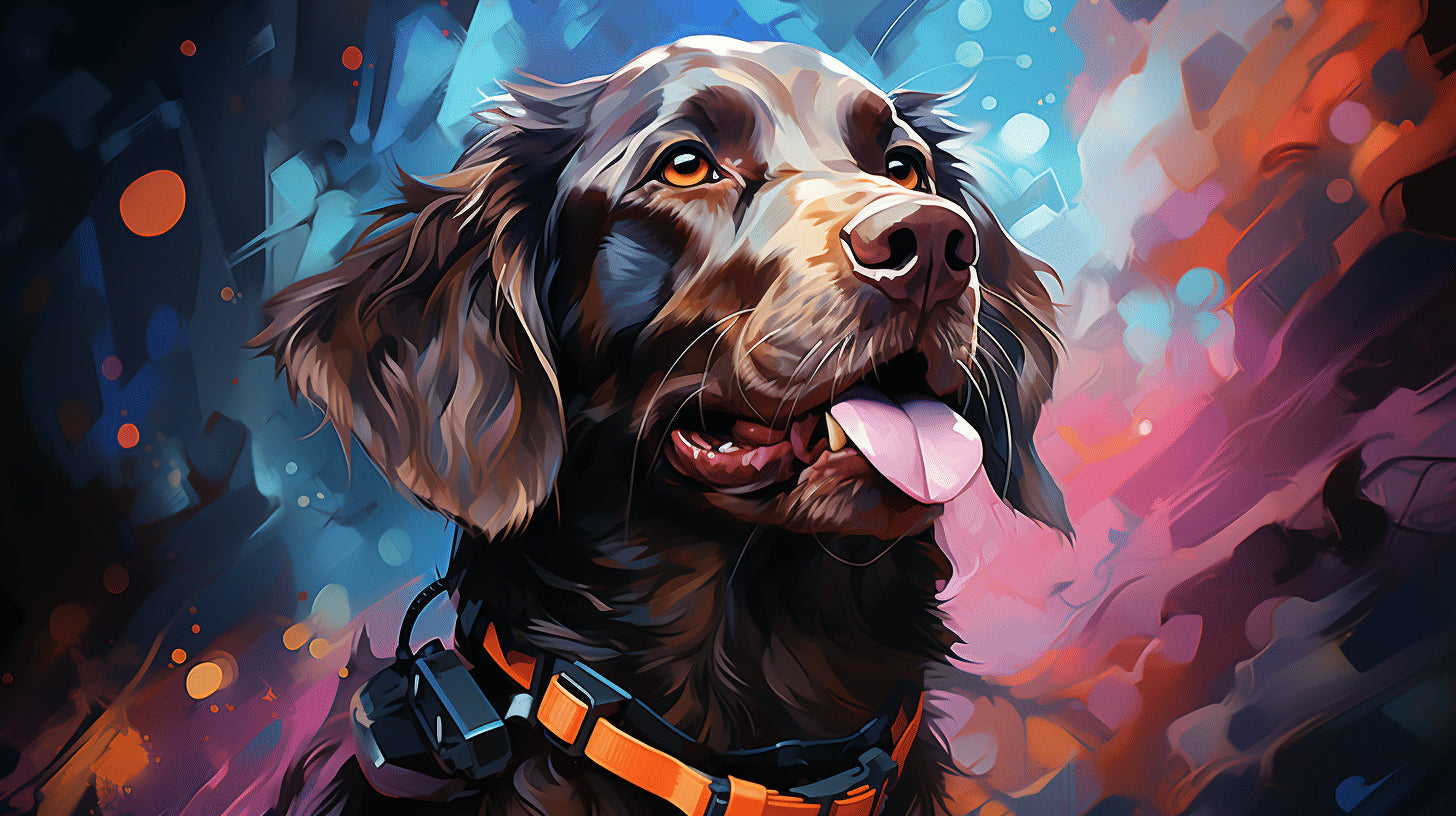Dogs have been our faithful companions for thousands of years – providing us with unquestionable loyalty, boundless love, and a myriad of health benefits. They are known as man's best friend for a reason. However, what happens when our cheerful and unstinted friend grapples with invisible adversaries such as anxiety and fear? Strangely, our furry friends deal with such emotional predicaments quite similar to humans. Yes, Dog Anxiety is real, and it's more common than you might think.
This guide aims to illuminate the reality of dog anxiety - its incidence, the impact it can have on your canine companion, and most importantly, how you as an owner can help alleviate this distressing condition. From understanding the cause of anxiety in dogs to exploring avenues for help and support, we'll delve deep into this challenging subject. With patience and understanding, we can help our furry friends to live a happier, less stressful life. So, get ready to embark on a journey of shared empathy, resilience, and love for our four-legged companions. Together, we will unravel the heart-touching world of dogs and their battle against anxiety.
Understanding Dog Anxiety
Canines, like humans, exhibit a wide range of emotions; joy, anger, excitement, and even anxiety. The reality is a staggering 70% of our furry friends display signs of anxiety. While as pet parents, it might be easy to brush off your dog's anxious behavior as mere mischief, unwavering attention and knowledge about Dog Anxiety could be key to ensuring your tail-wagging friend is mentally healthy. After all, awareness is the first step to finding solutions for dog anxiety.
Prevalence of Anxiety in Dogs
The prominence of anxiety in dogs cannot be overstated, with the data from recent years showcasing startling rates. Specifically, evidence that anxiety provoked by other animals has skyrocketed, ballooning from 16.5% in 2020 to a mind-boggling 43.52% in 2022, nearly tripling. This exponential hike signals a trend, heralding a developing narrative that is becoming hard to ignore.
Separation Anxiety in Dogs
As we all know, dogs are pack animals, they robustly embrace companionship and shower us with unconditional love. However, this bond can come with its emotional setbacks. The data suggests that the incidence of separation anxiety in dogs has surged dramatically by 760%. Our pets might be struggling to deal with our absence, showing signs of restlessness, destructive behavior or excessive vocalization where they are left alone or separated from their caretakers.
Increase in Anxiety Display
With such staggering statistics, it is clear that there is an increase in the display of anxiety among dogs recently. This could be attributed to several factors, such as changes in their surroundings, a disruption to their routine, or the presence of other animals. It serves to remind us that, as dog owners, we need to be keen observers, watching out for subtle cues and changes in their behavior.
Anxiety-related Behavior vs Mischief
Often a common mistake while dealing with dog anxiety is confusing their anxiety-related behavior for mere mischief. Anxieties may be expressed as restlessness, excessive chewing, whimpering, or even aggression. Recognizing these symptoms for what they are rather than dismissing them as 'bad behavior', is vital in laying the groundwork to understand, empathize, and subsequently find effective solutions for treating our dogs' anxiety.
Indeed, understanding dog anxiety is not a straightforward journey, but it's a journey worth embarking on for the emotional health and happiness of our beloved pets. Armed with this knowledge, we can now better discern the enigmatic behaviors of our furry companions and find effective remedies like those highlighted in our article on solutions for dog anxiety, making our pets emotionally secure while strengthening the bond we share with them.
Benefits of Dog Ownership to Human Mental Health
Owning a dog isn't just about companionship, fun playdates, or having an ever-loyal friend with a wagging tail waiting for you when you get home. There's something more profound and innately therapeutic about our relationship with our four-legged friends. It's their ability to remarkably boost our mental health.
An impressive 74% of pet owners have reported a positive shift in their mental health once they opened their doors for a pet. It may seem like a simple statistic, but it's a testament to the profound psychological impact a pet, especially a dog, can make in our lives. These furry pals offer more than meets the eye and touches the depths of our psyche in ways we're only beginning to understand.
Stress, anxiety, and depression are becoming increasingly prevalent in our societies. Peace of mind may seem like a far-off dream under these conditions, and this is where our canine friends can lend a helping paw. Studies show that owning a dog has been linked to reduced feelings of stress, anxiety, and depression in humans. They offer us a much-needed circle of emotional safety that shields us from these psychological battles, becoming essential allies in promoting our mental wellness.
Next time you're petting your dog, take a moment to recognize the tranquility that washes over you. It's not merely a feeling but a physiological change in your body. Research indicates that the simple act of stroking a dog can lower the stress hormone levels in humans. It's as if with every gentle stroke on their furry bodies, we dissipate the clouds of tension hanging over our heads, bringing in a torrent of calmness and contentment.
In summary, the health benefits dogs provide extend far beyond their roles as loving pets. They serve as quiet therapists, offering comfort in times of distress and promoting a sense of well-being. The depth of this bond goes much further than words can express, bringing joy and solace to many, above all improving human mental health.
Techniques and Treatments for Relieving Dog Anxiety
Seeing our furry best friends struggle with anxiety can be heart-wrenching. Luckily, there are several techniques and treatments available to help alleviate your pet's stress, ranging from behavioral modification training to natural treatments and medications.
Behavioral Modification Training
One efficient method of relieving dog anxiety is behavioral modification training. This approach focuses on changing your pet's response to stress, fears, or phobias. This practice needs patience and consistency, but the results are definitely worth it. You can read more about it in our article about Overcoming Dog Anxiety with Training.
Natural Treatments
For pet owners who prefer using more holistic approaches, several natural treatments can be used. These include using calming pheromones, administering natural supplements, or including probiotics in your pet's diet. Moreover, therapies like microcurrent pulse electromagnetic fields have garnered attention for their effectiveness.
Exercise and Physical Contact
Exercise and physical contact can't be underestimated when it comes to relieving anxiety in dogs. Regular walks, games of fetch, and even pet massages can help keep your dog calm. Physical contact, such as gentle stroking or holding, can instill a sense of security in your pet, reducing anxiety levels.
Distraction Techniques
In certain situations, distraction techniques can work wonders. This may involve giving your pet a new toy, initiating a game, or even playing calming music.
Creating Calm Environments
Your dog's environment greatly affects its mental state. Creating a calm, safe space where your pet can retreat to during anxiety-inducing events can do wonders for its nerves. This includes providing swaddling beds or using proper introduction techniques when introducing new people or animals.
Anti-Anxiety Clothing
Have you ever heard of anti-anxiety clothing for dogs? Products like anxiety wraps or thunder-shirts may offer relief. They work by applying gentle, constant pressure on the dog’s torso, which has been linked with calming effects in both animals and humans.
Medication Treatments
If your dog's anxiety persists, medication treatments, prescribed by a veterinarian, may be your best option. Anti-anxiety medications can help manage stress levels in your dog and provide some relief.
Remember, always seek professional advice when it comes to your pet's health. Each dog is unique, requiring an individual approach to manage its anxiety effectively. Keep exploring, testing, and learning until you find what works best for your dog.
Reducing Anxiety in Dogs Through Mental Stimulation and Lifestyle
Creating a calm, serene, and relaxed atmosphere for dogs can be genuinely transformative. If you're a devoted dog owner experiencing the heartache of seeing your furry friend under the shadow of constant anxiety, don't despair. When it comes to soothing our dogs' frazzled nerves, a blend of both mental stimulation and lifestyle changes can make a world of difference. Then again, as any seasoned pet owner will tell you, understanding is the first step towards change.
Exercise and Mental Stimulation
Our four-legged companions are essentially descendants of wolves. They're naturally wired for running, chasing, and exploring. Imagine what a lack of physical activity could be doing to them. It's akin to an overcharged battery – all that pent-up energy turning into anxiety. Regular exercise is a tried-and-true method to keep your pet physically fit. However, mental stimulation is equally important. It's not enough to give them physical outlets. We must also engage their minds to keep them happy and relaxed.
There are many ways to provide dogs with mental stimulation. One of the popular methods involves food toys and snuffle mats. However, a truly magical piece of the puzzle are lick mats. According to this enlightening piece on how to Reduce Dog Anxiety with Lick Mats, they provide an excellent avenue for dogs to engage in repetitive licking, which helps them calm down on their own. Many dog owners have found similar search games to be incredibly helpful in reducing their dogs' stress levels.
Creating Routine
Routine and consistency are cornerstones of a stress-free environment for dogs. Our canine buddies appreciate and thrive in a predictable order of events. You see, in their world, the known is safe, and the unknown can be intimidating. If you maintain a consistent feeding, play, and sleep schedule, it fosters a sense of security and helps significantly reduce their anxiety.
Owners' Stress Management
Our pets are more connected to us than we might believe. They can sense when we're stressed, which inadvertently affects their own stress levels. The more calm and composed we remain, the more it not only benefits us but also them. Managing our own stress doesn't just make us better individuals, but also better pet parents.
Let's all commit to creating an ecosystem of peace and calm for our canine companions. It's our responsibility, and they deserve nothing less. This wholesome blend of mental stimulation, proper exercise, and a consistent lifestyle will have a profound impact on the way our pets perceive their world, thereby reducing their anxiety levels. Simultaneously, it’s critical for us as dog parents to also prioritize our stress management, since our inner calm invariably influences our dogs. It's the ultimate win-win. Together, let's make a delightful difference in our dog's lives, one happy tail wag at a time.
Conclusion
Navigating the world of dog anxiety can be an overwhelming challenge. Employing appropriate treatment techniques and creating a supportive environment can significantly improve a pet's quality of life. A couple of changes in routine, additional cuddle time, exercise and perhaps even accessories like the anti-anxiety vests from Empowered by Ashley can make a world of difference. With a dash of patience and a dollop of love, you may help your furry friends lead happier, more vibrant lives. Remember, ensuring their well-being is also a step towards fostering your peace of mind. Now, isn't that a win-win situation worth investing your efforts in? Visit Empowered by Ashley's official website here for solutions that cater to your pet's specific needs. Hope this comprehensive guide proves beneficial to you and your furry companions. Here's to happier paws and calmer wagging tails!
Frequently Asked Questions
-
What are some common signs of dog anxiety?
Common signs of dog anxiety include excessive barking, destructive behavior, restlessness, shaking or trembling, panting, pacing, loss of appetite, and avoidance behavior.
-
Can I use natural remedies to relieve my dog's anxiety?
Yes, there are several natural remedies that can help relieve dog anxiety, such as chamomile, lavender, CBD oil, and essential oils. However, it's important to consult with a veterinarian before using any natural remedies.
-
How can I create a calm environment for my anxious dog?
You can create a calm environment for your anxious dog by providing a safe and comfortable space, using white noise or calming music, using pheromone diffusers, ensuring regular exercise, and practicing positive reinforcement training techniques.
-
Are there any training techniques to help reduce dog anxiety?
Yes, there are several training techniques that can help reduce dog anxiety, such as desensitization and counterconditioning, providing mental stimulation through interactive toys, obedience training, and implementing a consistent routine.
-
When should I seek professional help for my dog's anxiety?
If your dog's anxiety is severe, persistent, or causing significant distress to your dog's daily life, it's recommended to seek professional help from a veterinarian or a qualified animal behaviorist. They can provide specialized guidance and develop a tailored treatment plan.
















Leave a comment
This site is protected by hCaptcha and the hCaptcha Privacy Policy and Terms of Service apply.